The Future of MASS is Drawing Closer
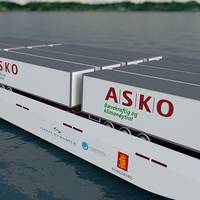
An automated vessel is one where advanced decision support systems onboard the vessel, like the Global Positioning System (GPS) and auto pilot, undertake operational decisions independent of direct human control. A Maritime Autonomous Surface Ship (MASS) involves both automated systems and remote control operations. In August 2016, The Wall Street Journal published an article titled “Ship Operations Explore Autonomous Sailing.” The article suggested that by 2030 there would be remotely controlled ships and that by 2035 there would be MASS on the high seas.In 1974…
Fishermen Turn to Apps and AI to Tackle Climate Change
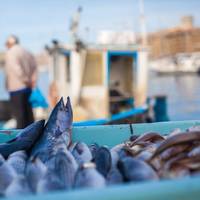
From weather predicting apps to using artificial intelligence to monitor the fish they catch, small-scale fishermen and coastal communities are increasingly turning to digital tools to help them be more sustainable and tackle climate change.Overfishing and illegal fishing by commercial vessels inflict significant damage on fisheries and the environment, and take food and jobs from millions of people in coastal communities who rely on fishing, environmental groups say.In addition…
GPS Unreliability
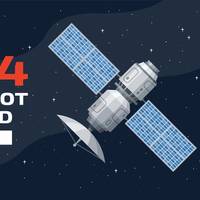
The Global Positioning System (GPS) has become vital to the maritime community. Proper use of properly functioning equipment can allow ships to safely navigate worldwide. It’s signals are now integrated into a variety of shipboard items, including the automatic identification system (AIS) and the electronic chart display and information system (ECDIS). It has been copied by Russia’s GLONASS, Europe’s GALILEO, China’s BeiDou, India’s IRNSS, and Japan’s QZSS. Originally developed for the US Navy for ship positioning and navigation…
Polymer Pioneer Receives Engineering's Highest Accolade

On October 31st, 2019, George A. (Sandy) Thomson, the founder of Thordon Bearings and a pioneer in the development of advanced polymer materials, was presented with the 2019 Elmer A. Sperry Award in recognition of “leading the innovation in water-lubricated propeller shaft bearings” in marine transportation through the use of polymeric compounds.The award was presented to Mr. Thomson at the SNAME Maritime Convention, in Tacoma, USA, by the Chairman of the Board of the Institute of Marine Engineering, Science and Technology (IMarEST), Mr.
St. Croix Upgradess with New Lake Assault Boats Craft
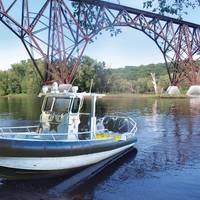
The St. Croix County Sheriff’s Office in Hudson, Wisconsin, earlier this summer took delivery of a Lake Assault Boats rigid hull inflatable boat (RHIB). The new boat enhances the office’s patrol capabilities and water-based emergency rescue operations on a 27-mile stretch of the St. Croix River, a National Scenic Riverway.“Our stretch of the St. Croix River is a heavily used recreational area, with many cabin cruisers, houseboats, and all types of pleasure craft while, further north…
Oi: Tracking 50 Years of Ocean Innovation

As Oceanology International celebrates its 50th Anniversary, Marine Technology Reporter explores half a century of subsea technology development and discovery. Oceanology International Americas runs February 25-27, 2019 in San Diego.When Oceanology launched in 1969 in the seaside resort of Brighton the world was a very different place. For a start, Brighton was home to the mods and rockers, who would square off against each other on the town’s elegant seafront. The British currency included shillings and ha’ pennies and man had yet to step foot on the moon.More crucially…
Answering the Call for Environmental Answers
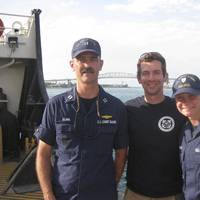
The Coast Guard has developed two separate mitigation system prototypes specifically designed for inland and offshore environments and tested them in the Kalamazoo River and Lake Huron.Whenever there is a need for oil, there will always be a risk of oil spills. This is no less true for bituminous sands, commonly known as oil sands or tar sands. Oil sands are mostly found in Alberta, Canada, and comprised of bitumen, sand, clay and water. They are typically viscous, with a texture similar to peanut butter.
USCG Navigation Center: Steering a steady course for safe, secure, efficient waterways
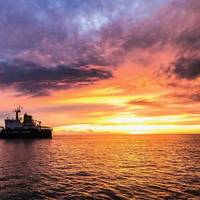
The U.S. Coast Guard’s Navigation Center (NAVCEN) is involved in a number of activities that have an impact on all Americans, even if they don’t realize it.From motorists checking directions with their Global Positioning System (GPS) to boaters to ships coming and going to U.S. ports, the NAVCEN plays an unseen but vital role.With a staff of19 officers, 17 enlisted personnel and 19 civilians, NAVCEN falls under the Director of Marine Transportation Systems (CG-5PW) at USCG Headquarters…
Cyber Incident Response for the Resilient Organization
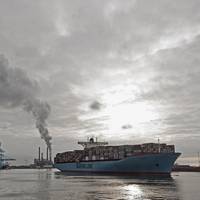
Even prior to NotPetya, regulatory bodies, insurers, P&I clubs, port authorities, and other segments of the maritime industry started taking steps to minimize the industry’s exposure to cyberattacks.The maritime industry has had an awakening. We have awoken to the fact that digitalization has woven its threads throughout the industry, and we have greatly benefited from being able to operate in an interconnected cyber environment. Likewise, being able to transmit shipboard machinery diagnostic information to shore-side operations centers…
Britain Reviewing Risks to its Satellite-Reliant Infrastructure
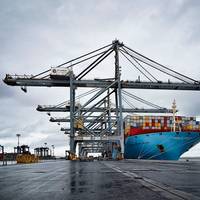
Britain is reviewing its reliance on satellite-based technology for critical infrastructure including the Global Positioning System (GPS) as the threat of jamming attacks and disruptions grows, a government report said on Tuesday. Emergency services, transport, communications and financial networks are among key sectors which depend on Global Navigation Satellite Systems (GNSS) such as GPS. Such technology needs accurate and reliable position and timing signals. Experts say the problem with GNSS is their weak signals…
Ocean Guardian: Simplifying Environmental Compliance
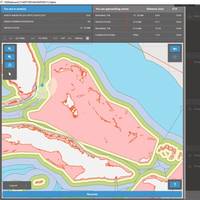
Environmental compliance challenges are nothing new to the cruise industry. Initiatives to enhance environmental compliance, from clean technologies to improved processes and procedures, have significantly reduced the impact cruise vessels have on the environment and improved the quality of discharge. These onboard initiatives address what is in the vessel’s control, but cannot simplify the increasingly complex regulatory environment in which cruise lines operate. Enforcement of environmental regulations is on the rise as international…
Cyber Threats Prompt Return of Radio for Ship Navigation
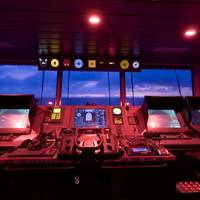
The risk of cyber attacks targeting ships' satellite navigation is pushing nations to delve back through history and develop back-up systems with roots in World War Two radio technology. Ships use GPS (Global Positioning System) and other similar devices that rely on sending and receiving satellite signals, which many experts say are vulnerable to jamming by hackers. About 90 percent of world trade is transported by sea and the stakes are high in increasingly crowded shipping lanes.
Global Shipping Feels Fallout from Maersk Cyber Attack
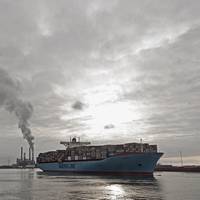
Global shipping is still feeling the effects of a cyber attack that hit A.P. Moller-Maersk two days ago, showing the scale of the damage a computer virus can unleash on the technology dependent and inter-connected industry. About 90 percent of world trade is transported by sea, with ships and ports acting as the arteries of the global economy. Ports increasingly rely on communications systems to keep operations running smoothly, and any IT glitches can create major disruptions for complex logistic supply chains. The cyber attack was among the biggest-ever disruptions to hit global shipping.
DSC Dredge Digs In
The world of dredging is defined by the vast diversity of each assignment that contractors perform on any given day. Fortunately, DSC’s standard lineup of dredge equipment can be modified and customized to meet just about any job that needs doing. It wasn’t too long ago that retired U.S. Coast Guard Admiral Jim Loy told me, “If you’ve seen one port, well, you’ve seen one port.” That now-famous declaration was made in reference to port security in a post-9/11 world, but the quip is as valid now as it was when he said it during his tenure as Commandant of the U.S. Coast Guard. Similarly, it can also be said that if you’ve seen one dredging operation, well, then you’ve seen one dredging operation.
US Coast Guard Awards Navigation System Contract
The Coast Guard's Command, Control and Communications Engineering Center (C3CEN) awarded a contract to FLIR Maritime US, Inc., of Nashua, New Hampshire, Wednesday, for the Scalable Integrated Navigation System, Two (SINS-2). The single award Firm Fixed Price Indefinite Delivery, Indefinite Quantity contract is valued at $50 million and consists of a five-year base with a five-year option. The total period of performance is 10 years. The Coast Guard originally procured legacy SINS for a portion of the small boat fleet in 2002, and the original components have significantly exceeded their life expectancy. Efforts to refresh legacy SINS began in August 2013 with revising the system’s required specifications…
Insurance Gaps Leave Shipping Exposed to Cyber Attacks
Ships exposed through GPS systems, have limited back-up; cyber insurance typically doesn't cover jamming, property damage. Shipping companies grappling with the threat of cyber attacks on vessels are finding insurance policies often fall short, officials involved in both industries say, a risk that could feed through into global prices. Digitalisation means electricity networks, emergency services, industry and agriculture are all vulnerable to hacking by criminal gangs for extortion or, for political reasons, by militant groups or foreign states. But ships are also exposed to interference through electronic navigation devices such as the Global Positioning System (GPS) and lack the backup systems airliners have to prevent crashes.
Custom Dredge Keeps Santa Cruz Harbor Clear
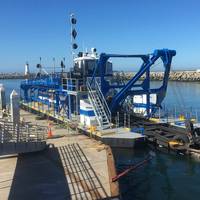
The winter of 2016 was an unusually harsh one for the Santa Cruz Small Craft Harbor in Santa Cruz, Calif. Four years of drought was followed by an El Niño season that brought storm water runoff, high tides, high surf and swells – rapidly creating a complete shoaling of the federal entrance channel to the harbor and blocking all boats from entering or leaving. The dredge Seabright that had served the harbor for 30 years labored to keep up, and frequent breakdowns only compounded the problem.
Drones: Is the Maritime Industry Ready?
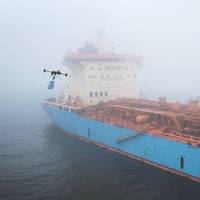
Unmanned aerial systems (UAS), or “drones” in common parlance, are not a part of the historical maritime vocabulary. At least not yet. While the term “drones” may conjure images from science fiction, the reality is that companies are designing commercial UAS for the private sector, and they are gradually permeating our daily life. Henry Ford is rumored to have opined on his invention of the automobile that if he had asked people what they wanted, they would have said “faster horses.” In the case of UAS…
Konecranes Deliver RTG Trio to MSC
Konecranes has announced its third RTG delivery to the Mediterranean Shipping Company (MSC) Terminal in Valencia, Spain. When the three RTGs on order go into operation, MSC Terminal Valencia will operate a fleet of 18 Konecranes RTGs. The cranes will be delivered by spring 2017. Sven Valentin, Terminal Manager of MSC Terminal Valencia, commented: “Our Konecranes RTGs are central to the continuing success of this terminal. They are high-performing, reliable machines that our operators like to drive. The 16-wheel RTGs will be equipped with Konecranes’ Active Load Control, Diesel Fuel Saver system, GPS Auto-TOS reporting and Auto-positioning. They will have a lifting capacity of 40 LT, stacking one-over-five containers high and six plus truck lane wide.
EU Pulls Plug on Back-Up Nav System
A British-led initiative to create a back-up to satellite navigation systems for ships has been pulled after failing to garner interest from other European countries, despite its proponents pointing to the growing risk of disasters at sea. Vessels increasingly rely on devices that employ satellite signals to find a location or keep exact time, including the Global Positioning System (GPS). Paper charts are used less frequently due to a loss of traditional skills among seafarers. Experts say GPS is vulnerable to signal loss from solar weather effects or radio and satellite interference or deliberate jamming, which South Korea experienced from North Korea in recent years.
Spotlight: Cyber Risk Management
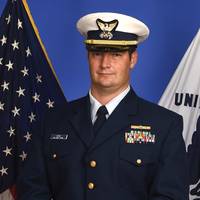
An increasing number of systems on ships and at marine facilities depend on cyber technologies for routine operations. While cyber technology has improved efficiencies in the marine industry and around the world, it has also created potential vulnerabilities. For example, the towboats that move goods through the Western Rivers and along our coasts rely heavily on electronic navigation systems, including Automatic Identification System (AIS) and Global Positioning System (GPS), to safely transit around riverbends, capes, and shoals.
Idreco Delivers Dredger for Hydro-Dam in Congo
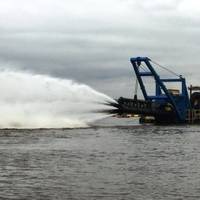
Idreco (International Dredger Constructions) of the Netherlands informs it has designed, built and installed its second dredger, an ISD 600 with a digging depth of 30 meters, at the Inga Dam in The Democratic Republic of Congo. The dredge has a mixture production and solids production of approximately of 5,000m3/hr and 1,500m3/hr using an Idreco designed IDP 600 pump. The Inga Dam, operated by Société Nationale d'Électricité (SNEL), is the largest hydro-dam in Africa and generates approximately 1,775 megawatts of electricity.
Threats to Global Navigation Satellite Systems
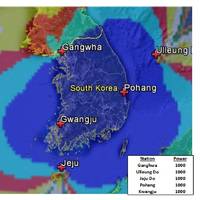
Originally developed to guide Allied convoys safely across the Atlantic, the use of synchronized low frequency radio signals as a navigational aid revolutionized modern maritime navigation in the 1940s. Faced with operating ships and aircraft over vast areas, researchers pioneered the use of radio signals to aid navigation in regions where poor weather conditions made traditional methods—such as dead reckoning and celestial navigation—exceptionally difficult. This system was eventually named LORAN.












